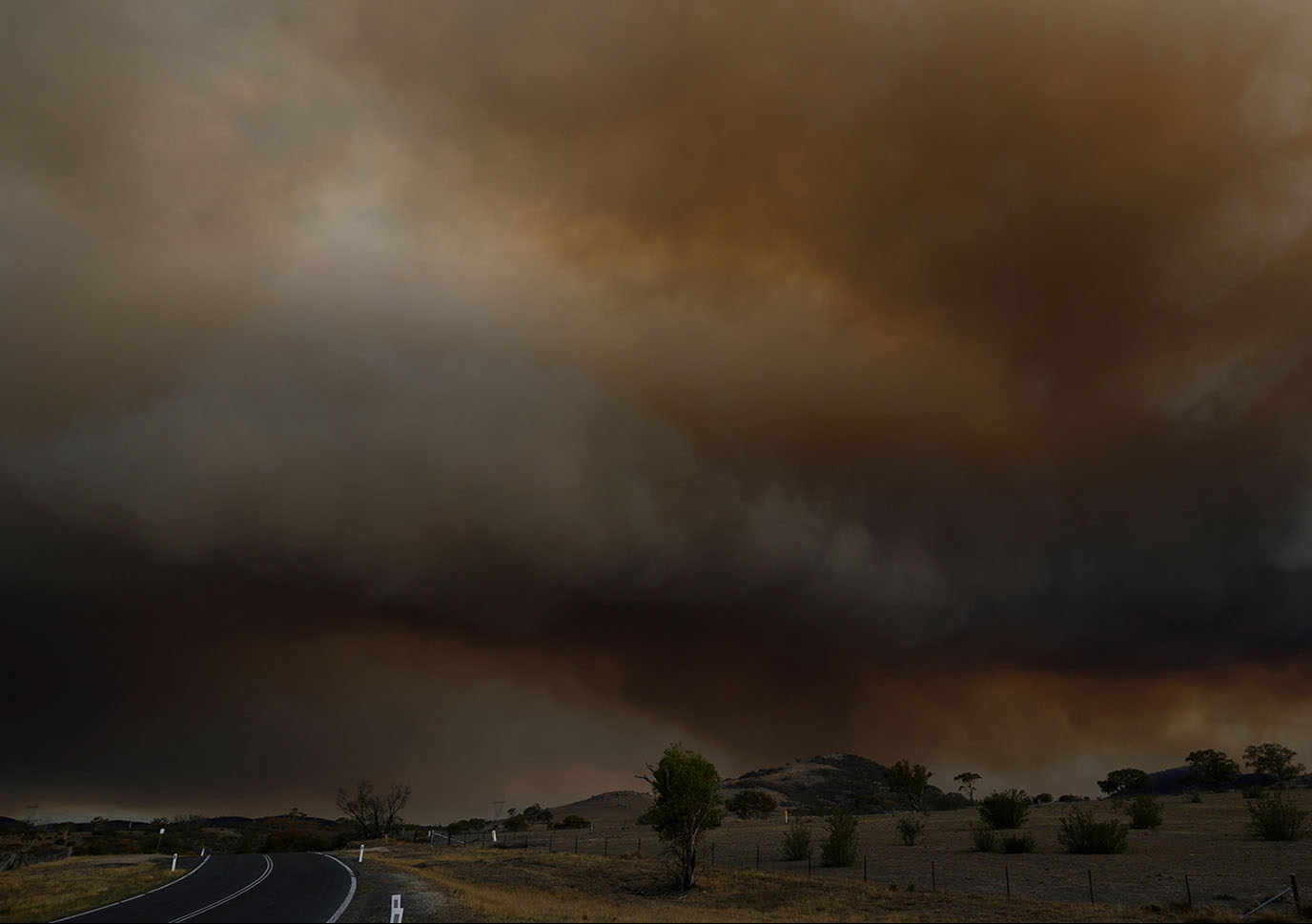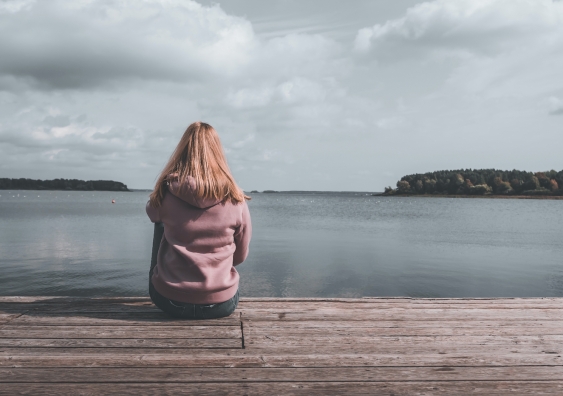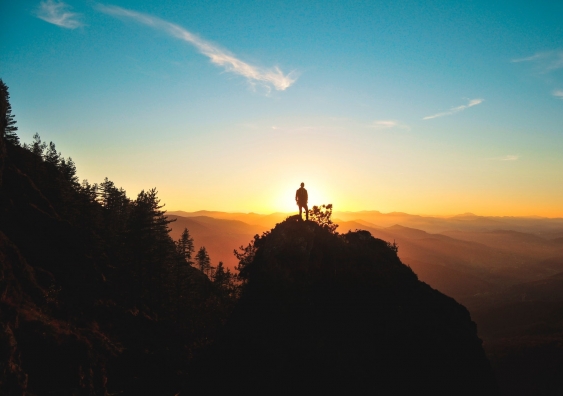A scientist from UNSW explains how the climate crisis is affecting the mental health of young people worldwide.
In August 2018, student Greta Thunberg famously stood outside the Swedish Parliament with a sign that read "Skolstrejk för klimatet", which translates to "school strike for climate".��
Since then, school students around the world have skipped some Friday classes to participate in demonstrations to demand action from political leaders to prevent climate change and call for the transition to renewable energy.
While the impact of climate change on our physical health – such as respiratory diseases and tropical diseases – has dominated the research landscape, the emotional and psychological repercussions are less understood.��
However, as global temperatures continue to rise and climate change increasingly informs public discourse, climate anxiety research has come into focus, and emerging studies have revealed the mounting toll it is taking on young people.��
In fact, have found that over 50 per cent of people aged 16–25 felt sad, anxious or powerless, or had other negative emotions about climate change.��
In Australia, from last year found that more than three in four young Australians are concerned about climate change, and two-thirds believe climate concerns are having a negative impact on youth mental health.
“Eco-distress, or eco-anxiety, is not necessarily a new area of research. There’s some fascinating older research on how people are affected by degradation to their local environment, for example,” says Dr Samantha Stanley, from the UNSW Institute of Climate Risk & Response, whose research includes a focus on the emotional impacts of climate change.
“But as we’re entering a climate-changed world, more people are experiencing distress about the environment without necessarily having that first-hand experience of environmental disaster. I think it's an old area that was not very popular and has suddenly exploded.��
“While these concerns are not pathological – it’s not something to be diagnosed with – it is something that researchers are interested in understanding, to know how it may be affecting people’s wellbeing more generally or even potentially motivating them to take part in climate actions like protest.”
Media enquiries
For enquiries about this story and to arrange interviews, please contact Lilly Matson.
Tel: 0426 656 007
Email: l.matson@unsw.edu.au
Defining eco-anxiety
While we know it is affecting more people, what exactly is eco-anxiety?
“One of the hardest questions is actually how do you define it,” says Dr Stanley. “There are lots of different terms, and sometimes people are talking about specific emotional responses like feelings of anxiety or anger about climate change, and other times they're describing a more general distress response that might include a range of emotions and a range of negative thoughts and experiences.”
Broadly speaking, eco-anxiety is the most common term, and it refers to an anxious response to a range of ecological issues, from climate change and pollution, to climate migration and climate justice concerns. When these concerns centre on climate change in particular, it is referred to as 'climate-anxiety'.��
Currently, eco-anxiety can be comprised of :
Affective symptoms: feeling worried, nervous or on edge.
Behavioral symptoms: where the worry and concern about environmental problems is affecting someone’s daily life. It may impact their ability to work or study, or may disrupt their sleep or socialising.��
Rumination: when someone is unable to stop thinking about environmental problems.��
Personal impact anxiety: a focus on their own role in contributing to environmental issues, including a focus on how they can address the problem.
“From our research, which has been led by my PhD student Teaghan Hogg from the University Canberra, it appears that those four different aspects of eco-anxiety reinforce each other,” says Dr Stanley. “Generally, we find that they're all interrelated. So the more you experience one, the more you tend to experience the other.
“When we measure eco-anxiety, we tend to find that people fit along a spectrum, from not at all or to a very slight degree, to a high degree, with .”
Who is it affecting?
Eco-anxiety has to be .��
“The fact that younger people tend to be most affected by climate and eco-anxiety is quite a robust finding that lots of researchers are reporting,” says Dr Stanley. “ have , and when they do find differences, they tend to report that eco-anxiety may affect women and gender diverse people more than men.”
But why is eco-anxiety affecting young people so strongly?
“We know that socially, adolescence is a period where people are kind of waking up to what's going on in the outside world, and it can be a time when young people become invested in global issues,” says Dr Stanley. “So they're seeing this big problem happening, they're also seeing that not enough is being done to resolve it. This age group is in a position where they may feel that they have low political power – they can’t vote, and it’s hard to get politicians to listen to their concerns about climate change. So there’s frustration about that as well.”
Dr Stanley has collaborated with her PhD student and collaborators to also analyse different variables that may make someone more exposed to eco-anxiety, such as financial stress. “People who are experiencing more financial stress, like trouble paying the bills, .”
Another possible association with eco-anxiety is individual experience with climate change. In a co-authored by Dr Stanley, survey results suggested that feelings of solastalgia – defined as a sense of distress caused by living through ecological change – in relation to the 2019-2020 bushfires was not necessarily correlated to the direct impacts of bushfire, but to the experience of grief for wildlife lost as a result of the bushfires. Interviews with people affected by these bushfires also highlighted the emotional impacts, with participants describing “a grief for the loss of the bush”.��
“Indirect exposure and engagement with climate information is also really significant,” says Dr Stanley. “You don't have to have those direct experiences to feel or be impacted by eco-anxiety. It could be that you're reading about it, often you're exposed to information about it, and just that awareness itself is resulting in distress.”
The link between eco-anxiety and mental health
Dr Stanley says she is often asked whether eco-anxiety is just affecting people who are generally anxious.��
“There’s a strong relationship between general anxiety and eco-anxiety,” she says “but we don’t see them as the same thing.”
This means that while someone could score highly on measures of eco-anxiety, they don’t necessarily have an anxiety disorder. “One important point here is that we can’t say that their concern is out of proportion to the problem [of climate change] – it’s really quite rational to be distressed. A diagnostic criterion for anxiety disorders, from my understanding, often require that the anxiety response is out of proportion to the threat,” says Dr Stanley.
“I don’t think that eco-anxiety is a result of people being generally anxious, I think in many cases we should think of the ‘cause’ as being aware of what’s going on. Some people have described it a ‘moral injury’, where you see something terrible happening, and you feel terrible about it.”
While climate and eco-anxiety should not be defined as disordered experiences, Dr Stanley describes how they could be affecting people’s mental health. A shows that the more climate anxiety people report, the more they tend to report psychological challenges, such as impacts on wellbeing and life satisfaction.
“The meta-analysis found that there is a link between climate anxiety and mental health problems like depression and anxiety. One interpretation of this link is that climate anxiety could be a stressor that contributes to mental health problems, though we need more research to understand what experience tends to come first,” says Dr Stanley.
Findings from cited government inaction as the predominant factor affecting youth mental health. Meanwhile, various studies have sought to ascertain whether feelings of eco-anxiety can serve as a catalyst for change and action.
In a , led by Dr Stanley’s PhD student, cross-sectional analyses showed that people who are concerned about their role in contributing to ecological problems, and who have these concerns top of mind through repeated thoughts, are more likely to report doing things like conserving energy, taking public transport, and avoiding eating meat.
What are we seeing in the clinic?
In Australia, Psychology for a Safe Climate (PSC) is a not-for-profit organisation founded to foster emotional engagement with climate change. “PSC offers training for mental health practitioners on how to manage climate anxiety when it's brought up in a clinical setting,” says Dr Stanley.
While suggest that clinicians feel adequately equipped to address eco-anxiety in their patients, reveals that many clinicians feel unprepared and express concerns about the implications for the future workforce. “There's lots of discussion around how what we have in place at the moment to help people experiencing anxiety probably isn't fit for purpose for those experiencing eco-anxiety,” says Dr Stanley.
“Indeed, there is currently no consensus as to the level of climate-related anxiety symptoms that indicate clinically significant distress, and therefore warrant psychological treatment,” says Professor Michelle Moulds, a clinical psychologist from UNSW Psychology. “This issue is currently a topic of debate in the literature, and needs to be resolved before we can develop and evaluate effective psychological interventions.”
One thing Dr Stanley emphasises is that any feelings of worry are valid and legitimate – that ultimately, we are living in a climate crisis.
“A large part of my research is also focusing on climate solutions. While it’s important to understand how the climate crisis is making people feel, I don’t think we will ever solve eco-anxiety by treating it away. It would only really be effectively resolved when we tackle climate change and the other environmental challenges we’re seeing around the world today.”








